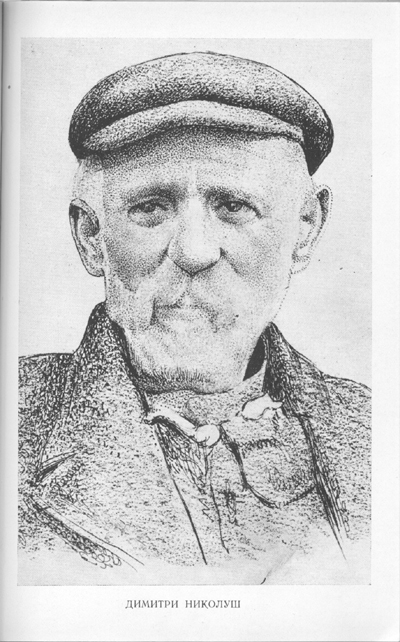Nikolush Dimitri
When I think of the battles we fought in the past, I think of my father.
On 10 October 1941 the first partisan shot was fired in Western Macedonia.
The First Partisan group, a group of 11 people's fighters from the village
of Krmsko (Mesovuno) -Kajlarsko killed the village president, an agent
of the Nazi occupiers. After 13 days, on 23 October, the tragic gatherings
at Mesovuno had taken place. The Nazis with artillery fire and all of
the other military capabilities from Kozhani surrounded the village
at dawn and fired from all sides, killing 153 men aged between 15 and
65. They banished all of the children and the women and set fire to
the village, burning it down.
During that time, the Greek police arrested my father because I was
a part of the group of fighters at Mesovuno. My father was aged 70.
In the Register of Births he was recorded under two surnames - Dimitri
Nikolush and Hadzhitashkos. The first surname was after his father who
was called Nikolush and the other was from his grandfather who had been
in adzhilak. In Kajlarsko all of the market stall-holders knew the old
dried hot chilli maker [piperdzhija] from Karadzhovsko. He was a hard
worker. On Sundays and holidays, he would not rest. If he did not have
work to do in his fields, he would travel around selling ground dried
chilli powder. With that work he was able to care for a family of six
and send me to the Voden high school and later to the Kozhani teachers
college.

After the events at Mesovuno my sister was arrested along with my
father. The authorities decided that my father was too old so they should
arrest someone younger from the family so that could persuade the teacher
- me - to give himself up. And so they arrested my sister too. The two
'dangerous' arrested people were sent to Kajlari and after 3-4 days
to Kozhani. After that they released my sister but sent my father into
exile to the town Livadija in southern Greece.
We hoped he would return so that we could see each other again. But
our hopes were not fulfilled.
In the month of April 1942 sad news arrived - my father had died on
30 March 1942. He had a serious illness and his life was taken while
he was far from his wife, his children and the village where he was
born. He was the last victim of the Mesovuno events and the first victim
of Katranica in the battle against the occupier.
One April day I was informed in Kajlari of the sad news. Dark clouds
covered the horizon and from morning to night a heavy rain fell. I had
never thought that my father could die in such a way. Shut in a room,
I thought of him for the whole day about his care for our family, for
me. We were also good friends. He understood that the battle against
the occupier and the fascists was righteous. He knew how bad an enslaved
life was and how bad life was for the very poor people.
I sought to find out about his life in Livadija. "National Solidarity"
(Ethnic Alilengi residents) helped the old Macedonian exile during the
hardest days. A Greek teacher and her family stayed with him during
the last moments of his life and closed his eyelids after his passing.
Greeks who were collaborators and servants to the Nazi occupiers arrested
an old Macedonian man and sent him into exile because his son fought
for the liberation of Greece. Other Greeks - the patriotic Greek people
- took him in their arms and stayed with him during the most difficult
and last days of his life. The roots of the two peoples are connected
from long in the past and are deep and that is why that connection cannot
be destroyed.
A Hadzhitashkov
From: For Sacred National Freedom: Portraits Of Fallen Freedom
Fighters
© 2009
Return to Index
For Sacred National freedom: Portraits Of Fallen Freedom Fighters
